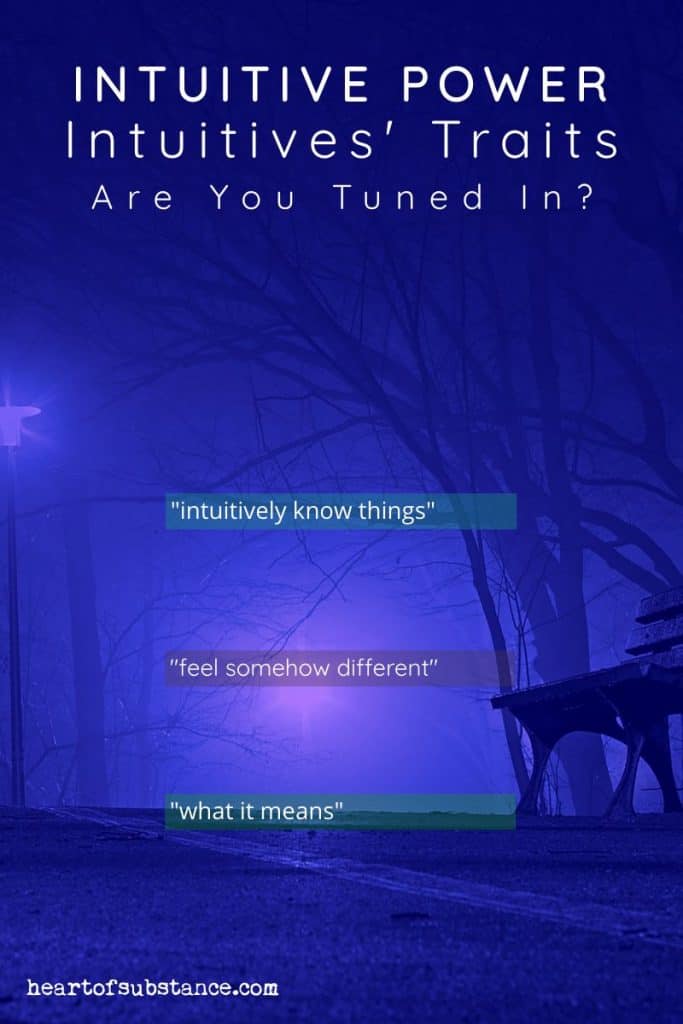Could this be you? Some people are naturally more intuitive than others. If you often find yourself just “knowing” things without solid proof or reasoning, you may be intuitive.
Countless well-known people acknowledge their intuitive abilities. So what does it mean to be an intuitive person?
Key takeaway: Signs your intuition is strong
When you…
– Find things just seem to happen easily, like they’re meant to be
– Have an immediate and accurate sense of when you’re being misled
– Experience meaningful coincidences (people or things show up in the right place at the right time) – See examples
– Can finish someone’s sentence in your head before they speak it
– Feel connected to a ‘Higher Self’
– Know who’s calling or messaging you before you look
– Have hunches that lead you onto the right path
– Wake up at the time you tell yourself the night before (without the help of an alarm)
Intuitive Person Meaning: What is an intuitive person
An intuitive person is someone who relies on their intuition or ‘gut feeling’ to make decisions and interpret the world around them.
Someone who is intuitive knows or has a ‘feel for something’ that’s right. Their channels are open to what I would call a ‘fast-paced knowing’.
Am I intuitive?
There are a few signs that you may be an intuitive person. One is you often have strong feelings about something that turns out to be right, even though it went against logic or reason at the time.
Another is being able to read people’s emotions and energy easily. You may sense what someone else is feeling before they even tell you.
If you’re not sure whether you have these traits, try paying attention to your hunches and how often they come true. Notice if you can easily pick up on other people’s energy and emotions.
Try out this fun intuition test to gauge your intuitive powers.
How intuitive are you?
These questions are for fun and are not scientifically proven to determine psychic abilities. Enjoy the quiz and see what you discover about yourself! If you answer ‘yes’ to all of these you might find you are one of those people with high intuition.
The intuitive person is never undecided: they are given their leads and hunches, and go boldly ahead, knowing they are on the magic path.
~ Florence Scovel Shinn, The Secret Door To Success (available at Amazon)
Intuitive personality traits. How to know if you are intuitive…
You are possibly an intuitive person if you display all or many of the following traits, in that you:
- See solutions in patterns and connections that others may not notice
- Have a ‘knowing’ about things subconsciously
- Tend to go with ‘your inner knowing’ (though it may not be logical and you can’t explain why you trust it)
- Display a level of thinking and sensitivity that sets you apart. for example, you
- Enjoy exploring new ideas and perspectives
- Are highly empathetic and compassionate
- Have a skill for understanding and relating to people from all walks of life
- Can sense what is going on beneath the surface of situations and people
- Are highly innovative and creative
- Can come up with novel solutions to complex problems and tend to be an independent thinker who challenges the status quo
Is it rare to have an intuitive personality? I’d say we are all adept in some way. Just maybe some are more innately intuitive or practiced than others.
You can try practicing your intuition by meditating and focusing on your inner voice. With time, you may find that your signs of intuition get stronger and more notable.
Here’s more depth about the intuitive characteristics you may notice…
You recognize Patterns and connections to arrive at answers
You compute meaning from underlying patterns of events or symbols.
Notice the word patterns. It is the main difference between logical and intuitive thinking, as cited in the research literature.1
Here’s my basic analogy. With logical thinking: A + B + C = D. With intuitive or ‘pattern thinking’: A + B + C is not straightforward but rather derives from a system, a pattern of events respective of the components — not explained logically.
A recent study described intuitive thinking or pattern recognition as one of two brain systems we use to arrive at our answers to problems.1 The second brain system involves analytical thinking. More on the science of intuition in another article. But what is pattern recognition?
how to spot an intuitive person
The following examples are possibly how you could spot an intuitive person.
Ability to read people
Intuitive individuals can be highly discerning of people. They tune into body language more closely than others and tend to identify patterns in a person’s behavior or personality that raise red flags or warning bells and scream “run…get far away”, that others don’t see. It can seem like paranoia, and it could be.
But then again, is it your deep knowing, your intuition, that allows you to see through the charisma, charm, physical beauty, and talent to sense something just not right beneath the surface?
You might find later that you were right in your call and find it hard not to say “I told you so” when it’s finally realized that that person is something else. Or…you could be completely wrong! In which case you’ll probably reflect on what set off those red flags and learn from it.
Intuitively Know Things
You know things from the info you receive subconsciously.
You have vivid dreams that at times have symbolized future happenings.
Thoughts drop into your mind that inspire you on the right track even though you can’t explain why or where they came from.
You get messages or sense things from inanimate objects, such as when you hold something worn by another person.
You think about things, and then they just happen. There is a lot of synchronicity (meaningful coincidences) in your life.
Ability to pick things up about your surroundings
Intuitive persons pick up on meaningful patterns in the surroundings around them that others miss.
Someone who is intuitive will have a keen sense of perception and an ability to pick up on subtle cues, even when they are not consciously aware of them.
For example, an intuitive person may walk into a room and immediately sense that something is off. They may not be able to put their finger on exactly what it is, but they have a feeling that something is not quite right.
This intuitive ability can be incredibly useful in many situations, from navigating social interactions to making important decisions. By tuning into their intuition, intuitive people are able to tap into a deeper level of understanding about their surroundings and the people in them.
Are highly innovative and creative
The creative ideas of intuitive people come from deep within or outside them, someplace that can’t be logically explained.
Creativity can be expressed in numerous ways, and it’s usually from recognizing patterns in the world and the people around you, that you get your ideas in creativity.
I wrote about this in Intuition and Creativity: How They Work Together!
As an intuitive person, you may find that you have a natural ability to come up with new and innovative ideas and to think outside the box. You may find that you are particularly good at brainstorming, problem-solving, and finding solutions to complex issues.
Your creativity may also manifest itself in other ways, such as in your artistic pursuits or in the way you approach your work. You may have a unique perspective on the world, and you may be able to see things that others miss. This can be a valuable asset in many different areas of your life, as it allows you to approach problems and challenges in a fresh and innovative way. So embrace your creativity, and let it guide you to new heights of success and fulfillment!
You Feel You’re Somehow Different
You display a level of thinking and sensitivity that sets you apart.
You easily pick up on the emotions of others. You are highly sensitive to these. You can literally feel the vibes. You may feel the anger, hate, depression, and tension in the air. This can be confusing to you if you are unaware of why that’s so. When you don’t understand why, you might take it personally as being directed at you when in fact it is someone else’s issue.
This has happened to me many times before I became aware of why I felt that way.
You may feel you don’t belong. You may be more mindful and seek out time alone.
You may attract other ‘intuitives’. They can sense your soul.
You tend to be an introvert.
You can be prone to addiction using this as a means of suppressing those feelings.
You trust Your inner knowing over logic
You ‘go with your gut’ (though it may not be logical and you can’t explain why you trust it).
You might do things such as pick up the phone when someone is about to call. Or, you might show up at a random time that coincides with a meaningful event.
You generally trust your intuition in making a call on something.
In relationships, you let in and let go of, the right people in your inner circle.
You follow that hunch that leads you to where you need to go or to meet that special someone.
You don’t use an alarm to wake up at a certain time but simply tell yourself the night before what time you wish to wake up the next morning.
You ask your spiritual guide, ‘the Universe’ or your God, for the answer and it responds.
Have a natural gift for solving complex problems in a unique way
As an intuitive person, you have a unique ability to solve complex problems by thinking outside the box. You tend to come up with novel solutions that challenge the status quo and push the boundaries of what is considered possible.
Your independent thinking allows you to explore new ideas and perspectives that others may not have considered.
Your creative approach to problem-solving sets you apart from others and makes you a valuable asset to any team.
You have a natural curiosity and a willingness to take risks, which allows you to uncover innovative solutions that others may have overlooked. Your ability to think independently and challenge conventional wisdom is a rare and valuable skill that sets you apart from others.
What does Intuitive mean?
Here’s an intuitive meaning from science: In the neuro- or brain-system field, it refers to the fast-paced process of recognizing underlying patterns to determine an answer or knowing.
If you’ve lived it, as far as the meaning of intuitive goes, you’re probably thinking… well there’s more to intuition than a ‘brain system’. For example, how do I explain those times when I happen to think of someone I haven’t seen for ages, and then suddenly they appear or contact me out of the blue? Or, those times when I forgot to check Google Maps for directions to an address but I just so happened to make the right turns to ‘magically’ get there.
How Intuition Feels
Intuition feels like guidance from above or some external connection… rather than a system of the brain. You might refer to this as ‘the Universe’, ‘Source’, ‘the Divine’, ‘God’, or other names of an all-empowering force. This is how most of us express it. Science admits it doesn’t know everything and that’s the beauty of it. With science, each recognized law or concept is purely a theory, accepted based on the weight of scientific evidence until a new theory comes along that challenges the previous one. So, maintain a curious mind and stay open to mystery.
How intuitive are you? Do you ever have strong intuition?
I know that it’s real. I don’t proclaim to be a psychologist or a neuroscientist, but I know of intuition because I’ve had lived experiences. And, I’m not the only one outside the fields of cognitive or brain science to recognize it. Supporting this are intuitive people who are highly successful. That’s a topic for another article.
Sources
- Tay, S. W., Ryan, P., & Ryan, C. A. (2016). Systems 1 and 2 thinking processes and cognitive reflection testing in medical students. Canadian Medical Education Journal, 7(2), e97-e103. See here.
- Pétervári, J., Osman, M., & Bhattacharya, J. (2016). The Role of Intuition in the Generation and Evaluation Stages of Creativity. Frontiers in Psychology, 7, 1420. doi:10.3389/fpsyg.2016.01420. See here.




